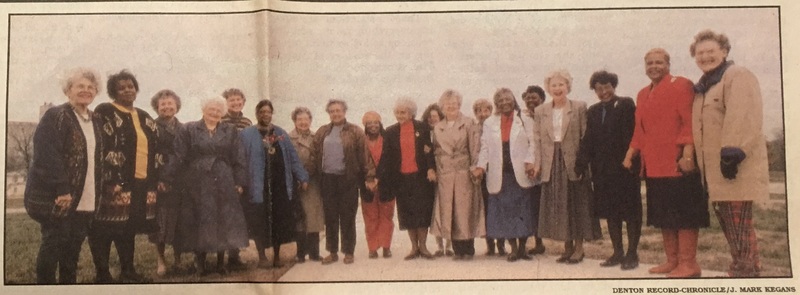The Denton Women's Interracial Fellowship
The Denton Women’s Interracial Fellowship (DWIF) was started in 1964 by a number of white and black women from the local Denton churches. During a time when white Dentonites responded to the civil rights movement with resistance and occasional violence, a small, bi-racial group of women met with a simple question: how to break down the barriers between themselves. What began as a simple question became a grassroots movement that achieved the kind of progress that was rarely seen in the Southern United States in this era.
The civil rights movement was active in North Texas in this period, with groups like the Dallas NAACP chapter working in inventive ways to break down segregation. Denton may have seemed like an unusual site for civil rights activity, because the African American population was barely 10% of the total city population, but it was a site of struggle. The DWIF's efforts began during a tense period in Denton's history in which demonstrators sat in at the university auditorium and picketed segregated restaurants.
The DWIF started small, meeting in the homes of members for intimate social occasions as members worked to get to know one another. Not too long afterward things began to open up and progress as members focusesd on their common bonds as parents with children in the soon-to-be-desegregated public schools. By the fall of 1964 simple interaction had turned into determined action as the DWIF became involved with a wide variety of local activities.
When the Denton schools desegregated and Fred Moore School, an institution in the African American community, closed down in 1968 the DWIF helped arrange carpools for black students to get rides to school well before bus routes were established. Several women also worked directly in the schools, tutoring students and reporting problems to the school board. The DWIF women were active in local politics, starting with going door-to-door registering voters for the 1964 election and informing voters about the candidates.
The biggest and most challenging project for the DWIF women required them to take to the streets: their goal was to improve the infrastructure of Southeast Denton, where a large majority of the black population lived along deplorable dirt roads and with sporadic water and sewer service. They began with a project to get the streets paved. The city council initially denied funding for the paving project, so the women of the DWIF distributed petitions, lobbied slumlords, and convinced residents to donate land to expand the streets. Piece by piece the streets began to be paved and sewer lines expanded, and the quality of life improved for the black neighborhood.
Afterwards the DWIF sponsored other local projects including job and "general help" fairs among their school activities, but by the 1970s many of the women began to enter different stages in their lives and meetings became fewer and fewer. Some went back to work once their kids graduated, others moved away, and many continued on to serve in different projects and organizations. Though the DWIF faded away, its impact on Denton and--of equal importance to many of the women--their friendships remained.
It all began with a dialogue. The University of North Texas Oral History Program now invites you to listen in and explore what kinds of impact a little talking can have.
